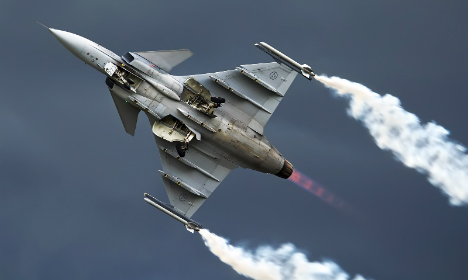Bern began seeking replacements for its 54 F-5 Tiger jets ten years ago, inviting Saab in 2008 to join the bidding war against French firm Dassault's Rafale and the Eurofighter Typhoon.
The Swedish maker's Gripen won the race in 2011, securing a 3.1-billion Swiss-franc ($3.5-billion) deal for 22 aircraft.
But the deal could yet fall apart when it is put to a popular vote on May 18, as latest opinion polls show that 52 percent of voters plan to shoot it down.
Some critics argue that the country has no need of new fighter jets, others are unconvinced by the quality of the Gripen, while yet others say that the jets could end up costing Switzerland far more than it bargained for.
But the pro-Gripen lobby argue that a modern airfleet is crucial for Switzerland's defence.
"An army without an airforce is like a house without a roof," the group said.
"We have to defend our neutrality. Therefore, we also have to have an airforce and we need modern airplanes," said the pro-Gripen lobby's deputy campaign chief Sven Bradke, firm in the belief that public opinion would swing his way.
But others argue that the country already has enough wings for its aerial defence.
"Switzerland has enough fighter jets," said Swiss Green Party parliamentarian Christian van Singer.
Besides the F5 Tigers, the country has 32 F/A-18s that were upgraded in 2010, at considerable expense.
"The F/A-18's are excellent, powerful planes, and there are enough of them for the task at hand: policing the skies," said Socialist parliamentarian Pierre-Alain Fridez.
But Gripen supporters cited a situation in January, when the airforce struggled to provide cover simultaneously for a meeting on Syria near Geneva and for the World Economic Forum taking place at the other end of Switzerland — Davos.
"We were lucky that time because it was good weather and we could fly the old Tiger airplanes," Bradke said, adding that the jets — void of sensors — could not fly at night or when it is overcast.
Others say the issue is not a shortage of planes but of pilots.
Opponents, who cannot nix the deal but who can block the funding needed to buy the planes, also say the purchase would be far costlier than the official price tag indicates.
If the training of pilots, maintenance and upgrades over the expected 30-year life-span of the planes, fuel and new armament, were to be taken into account, the Swedish fighters will actually end up costing around 10 billion francs, they say.
That is a very high price to pay "to let the military buy its new toys," said Amanda Gavilanes, of the pacifist GSsA group.
Bradke however questioned the critics' sums and said Saab is obliged to give Swiss firms contracts worth 2.5 billion francs over the next decade in exchange for the deal.
"That amounts to 10,000 people in work for one year, or 1,000 for 10 years… That's a lot," he said.
Saab is keeping a low profile ahead of the vote, after its decision to contribute financially to the "yes" campaign led to a backlash in public opinion earlier this year.
It opted to quickly withdraw its contribution, and Richard Smith, who leads Saab's campaign in Switzerland, voiced optimism the Swiss would accept the deal.
"Every customer is important so of course we hope the referendum is a 'yes'," said Smith.


 Please whitelist us to continue reading.
Please whitelist us to continue reading.
Member comments